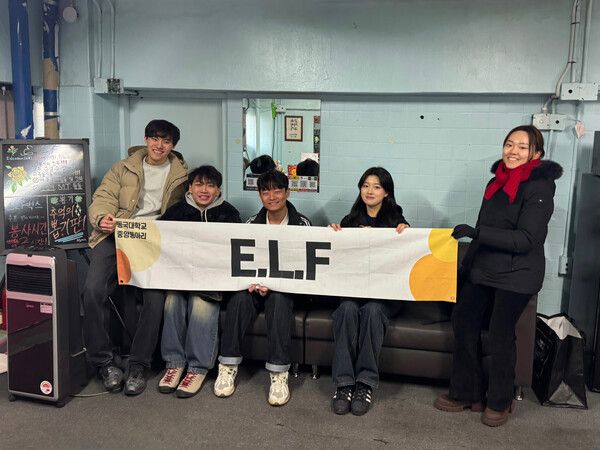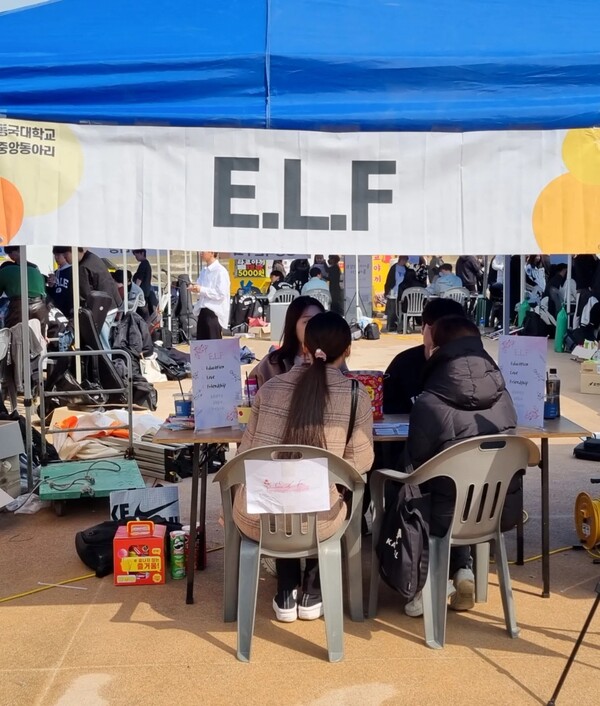E.L.F Builds Community

Established in 1970 and named after the values of Education, Love, and Friendship, the club has welcomed generation after generation of students committed to helping children grow both academically and personally. Through one-on-one mentoring and diverse group activities, members not only provide educational support but also develop empathy, responsibility, and meaningful human connection. Despite challenges in sustaining long-term participation, E.L.F has continued to adapt, supported by alumni, the university, and most importantly, the voluntary dedication of its members. This article takes a closer look at the heart of the club through an interview with its current president. The Dongguk Post explores how E.L.F carries forward its mission and what it means to lead a tradition of over five decades.
Q: Could you introduce the meaning behind the name E.L.F and the background of its foundation?
E.L.F stands for Education, Love, and Friendship, embodying the belief that love and friendship can be practiced through education. The club was founded in 1970 and has been established for over 50 years as Dongguk University’s representative educational volunteer club. In its early years, the goal was to provide consistent learning opportunities for children who had few chances to receive proper education, and that spirit continues to this day. However, as the world advanced rapidly, we gradually diverged from its initial vision, and the goal shifted from merely providing educational opportunities to teaching children emotions, the joy of sharing, and moral courtesy. That is, more than simply offering lessons, we aim to form genuine relationships with the children, creating a warm community culture mediated through education.
Q: What activities does E.L.F carry out, and what are its main purposes?
Our primary activity is mentorship in a one-to-one setting, conducted in collaboration with local children’s centers. However, the club’s mission goes beyond merely delivering subject knowledge or helping students complete assignments. What we truly aim to achieve is helping children discover their own potential, nurturing self-confidence, and promoting a genuine love for learning. To accomplish this, we value emotional interaction, taking the time to listen to their stories, understand their challenges, and grow alongside them rather than focusing solely on academics. In this sense, E.L.F functions not merely as an ordinary volunteer club but as a vibrant community where education, empathy, and the joy of sharing come together, shaping both mentors and mentees in the process.
Q: Could you share details about any recent or ongoing projects the club is working on?
Recently, we have collaborated with our partner institutions to publish activity reports in their newsletters. This project is meaningful because it shares our efforts not only within the club but also with parents and the local community members who support and encourage our activities. When stories of mentors and mentees are featured in articles, children feel their hard work and dedication are genuinely recognized. At the same time, mentors are not only encouraged to take even greater responsibility but also inspired to reflect on their role.
Q: Please describe the weekly volunteer sessions and the monthly gatherings.
Weekly sessions are held once a week from 6 P.M. to 7:30 P.M., where mentors and mentees meet one-to-one. The subjects are chosen by the mentees but adjusted to suit their level. At Samdong Children’s Center, elementary students focus on daily routines and basic learning, while at Jjomul Kingdom Children’s Center, middle and high school students prepare for exams and future career paths. Our monthly gatherings are divided into two types. The first is for building friendship, such as picnics or board games, which strengthen bonds among members. The second is academic, where we explore educational issues and enhance our expertise as mentors. Thanks to this supportive and developmental structure, E.L.F has continued to thrive.
Q: What reputation has the club gained, and what changes resulted from its activities?
We are recognized both inside and outside the university as a “reliable and consistent volunteer group.” Notably, alumni continue to show support and interest, which demonstrates that our activities have become a tradition passed down through generations. External institutions have also provided feedback that E.L.F brings “real changes to children’s lives.” Through such recognition, E.L.F is increasingly seen not just as a club but as an educational community.
Q: What educational gaps or differences in learning environments have you observed, and how are you addressing them?
The greatest issue we have discovered is that educational disparity is not merely about grades but also about basic study habits and emotional support. Some children struggle because of weak foundations in reading or arithmetic, while others simply hope for someone to watch over them consistently. For this reason, we begin by understanding each child’s individual situation. Mentors also share feedback regularly to develop tailored teaching methods. Our guiding principle is to practice personalized education, rather than simply providing tutoring.
Q: How does the club select the regions or institutions for its service, and what are the criteria?
Two main factors are carefully considered when choosing institutions for volunteer activities: accessibility for our members and alignment with the club’s purpose. With these priorities in mind, the club currently, partners with two organizations, “Jjomul Kingdom Children’s Center” near Seonyudo Station and “Samdong Boys Town” in Sangam-dong. Since the needs, expectations, and age groups of the children differ, our mentoring approach also varies. At Samdong, mentors primarily support elementary school students, focusing on building fundamental academic skills as well as cultivating daily habits. In contrast, Jjomul Kingdom mentors work with middle and high school students on advanced studies and career exploration.
Q: What has been the greatest challenge in operating the club, and how was it resolved?
The biggest challenge has been that lateness or absence by a mentor directly harms the mentees. Since our activities are strictly one-to-one, even a single gap can significantly affect a child. To address this, we introduced the “Participation Responsibility System.” This system is not meant as punishment but as a mutual promise to uphold responsibility in volunteering. Alongside this, the executive board quickly assigns substitute mentors when necessary. As a result, mentors became more committed, and trust between mentors and mentees was reinforced.
Q: Have there been any notable changes in activities or unique vision this year under your leadership?
As mentioned earlier, this year we for mally implemented the “Participation Responsibility System.” By institutionalizing attendance management and securing substitute mentors, we not only minimized gaps in service and greatly improved operational stability but also created a more reliable environment for children who depend on consistent guidance.
Q: Has the club collaborated with external organizations, schools, or other groups?
Our relationships with the two current institutions go beyond a simple “venue-provider and volunteer-sender” arrangement. We have built long-term partnerships. Additionally, we have participated in volunteer camps organized by the university during vacations, and we have also sought collaboration with other organizations to spread the value of educational volunteering.
Q: Could you share a memorable or impressive moment in the club’s history or activities?
One unforgettable moment was when a mentee wrote a handwritten letter to their mentor. The brief sentence, “Thank you for always helping me,” deeply moved not only the mentor but also the executive members. Another case was when a younger student who initially showed no interest in studying later asked to study voluntarily. Such moments remind us that we are not simply teaching knowledge, but truly making changes in children’s lives.
Q: How does the club secure the necessary resources and support?
Above all, the consistent support from alumni has been our greatest strength, as they not only provide financial and moral encouragement but also serve as inspiring role model for current members. The university, in turn, contributes by offering dedicated space for our activities and by providing partial funding that ensures the sustainability of our programs. However, beyond these invaluable resources, we believe the most important foundation of E.L.F lies in the voluntary dedication, passion, and steady participation of our members, who continuously invest their time and energy to nurture the spirit of the club and carry its mission forward.
Q: What is the club’s long-term vision and strategies for the future?
E.L.F aims to help children develop the ability to learn independently, rather than merely transmitting knowledge. To achieve this, we plan to expand regular seminars and workshops designed to enhance mentors’ teaching capabilities, leadership, and problem-solving abilities. In addition, we seek to broaden our activities through meaningful collaboration with external institutions such as local schools and cultural organizations to provide children with diverse learning experiences and exposure to different perspectives. In the long run, our goal is for E.L.F to become a representative model of volunteerism at Dongguk University and a community that leads social change through education.


